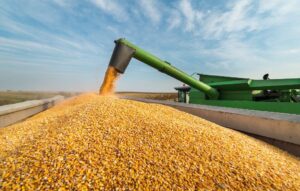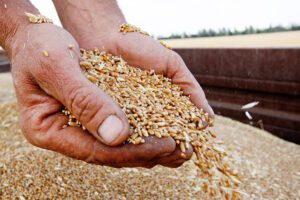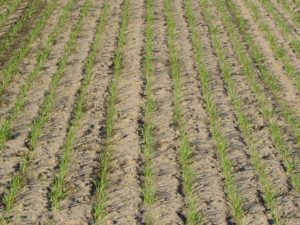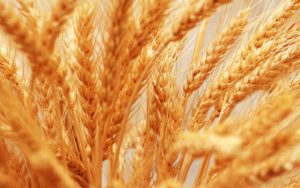
The Ministry of Agrarian Policy and Food forecasts in 2024 gross production of grain and oilseeds at the level of 74 million tons, of which about 52.4 million tons of cereals and 21.7 million tons of oilseeds.
As noted on the agency’s website, at the beginning of last year, the total gross harvest of grains and oilseeds for 2023 was also forecast to be almost 13% lower than the previous period, at 63.5 million tons, but weather conditions led to an increase in the harvest. Therefore, gross production in 2023 is about 82 million tons, of which cereals more than 60 million tons and oilseeds about 22 million tons.
“Forecasts for gross harvest figures are preliminary and will be adjusted during the year depending on circumstances, primarily weather conditions,” the Ministry of Agrarian Policy emphasized.
According to the forecast, in 2024, farmers will be able to harvest cereals in the following volumes: wheat – 19.2 million tons (22.2 million tons were harvested last year), barley – 4.9 million tons (5.7 million tons in 2023) and corn – 26.7 million tons (30.5 million tons).
Among oilseeds, soybeans are projected to increase. This crop is expected to produce 5.2 million tons, a year earlier 4.7 million tons were harvested. Sunflower production is forecast at 12.4 million tons versus 12.9 million tons, respectively. Rapeseed is planned to be harvested at 4.1 million tons, while last year’s crop was 4.7 million tons.
Sown areas of grain and leguminous crops are forecast at 10.6 million hectares, which is 395 thousand hectares less than in 2023. Of these, winter wheat is sown on 4.3 mln ha (-0.3 mln ha), spring wheat – 0.2 mln ha. (+0.2 thousand ha), winter barley – 0.47 million ha (-0.15 million ha).
The area of spring barley is forecasted at 0.94 million hectares (+0.06 million hectares), corn – 3.9 million hectares (-62 thousand hectares).
Among oilseeds, the area sown with soybeans is increasing. It is forecasted that it will be sown on the area of 2.2 million hectares. This is almost 400 thousand hectares more than last year. Sunflower will be sown almost as much as last year – 5.3 million hectares, rape – 1.5 million hectares, which is 0.1 million hectares less than last year.
The Ministry of Agrarian Policy, based on the results of a survey conducted in the State Agrarian Register on the preparation of agricultural producers for the sowing campaign of spring crops for the harvest-2024, reported that 70% of respondents plan to increase the area under soybean by an average of 21% compared to 2023.
The survey also showed that during the spring sowing season Ukrainian agrarians will prioritize grain legumes, the sown areas under which will increase by 11%, and spring barley – by 7%. It is expected that sown areas under spring rape will increase by 24%, sugar beet – by 17%, and under corn will decrease by 9%. Sunflower areas may potentially decrease.
Earlier, the Ministry of Agrarian Policy allowed a reduction in 2024 sown areas under spring crops by 0.5 million hectares or 3.7% compared to last season.

Agroholding “Kernel”, one of the largest in Ukraine, with a record yield completes harvesting of early grain crops, under which 70 thousand hectares are allocated, the press service of the agroholding reported.
“This year’s winter wheat yield, depending on the region of the cluster location, was from 5.8 to 7.3 tons/ha. The weighted average yield is almost 70% higher than last year’s figure,” the agroholding said on Facebook.
According to “Kernel”, on the post-harvest areas are implemented programs of biologization of farming. To support biodiversity and improve soil fertility, cover crops have already been sown on 22 thousand hectares.
It is noted that agronomic divisions of the agroholding continue to test and research the effectiveness of using different mixtures of cover crops to assess their impact on physical and chemical characteristics, microbiological activity of soil and phytosanitary condition of fields.
Before the war, Kernel Agro Holding ranked first in the world in sunflower oil production (about 7% of world production) and exports (about 12%). It is one of the largest producers and sellers of bottled oil in Ukraine. In addition, it is engaged in growing agricultural products and their realization.
The largest co-owner of Kernel through Namsen Ltd. – is Ukrainian businessman Andriy Verevsky, who this year increased his stake from 41.3% to 74.05% as part of the buyout and delisting of the agroholding from the Warsaw Stock Exchange.
Kernel’s net profit for the first nine months of FY 2023 (July-2022-March 2023) rose 36% to $437 mln, while revenue fell 45% to $2.715 bln.

Ukraine in the 2021/2022 marketing year (July-June) intends to export more than 60 million tonnes of grain crops, while ensuring the throughput capacity of seaports will become an important challenge in the issue of its logistics, the Ministry of Economy said on its website, citing deputy Minister of Economy, Trade Representative of Ukraine Taras Kachka on Friday.“Even ten years ago, the issue of the throughput capacity of Ukrainian seaports caused lively discussions, but over the past five years their capacity has increased – from 49.3 million tonnes in 2016 to 81.5 million tonnes in 2021. The sea transportation sector operates without delays, while we are observing the volatility of prices for rail transportation,” the Deputy Minister said at the Global Grain Conference 2021 in Switzerland.According to him, the strategy of the Ukrainian government is aimed at developing infrastructure in the logistics industry in order to attract investors to it.Kachka specified that Ukraine is implementing a number of measures within the framework of the Agreement with the World Trade Organization on trade facilitation, such as the introduction of a Single Window mechanism for international trade, the institution of an authorized economic operator, and a joint transit regime. This will allow Ukraine to enter the list of countries with the safest and most comfortable conditions for doing business.The Trade Representative of Ukraine recalled that growth of global demand for freight transportation amid the weakening of quarantine restrictions raised rates on them to multi-year highs and increased industry revenues, which allows investing in the latest technologies, digitalization, automation, etc.As reported, the Ukrainian Grain Association (UGA) in November estimated export of grains, legumes and oilseeds from Ukraine in 2021/2022 MY at 68 million tonnes with a harvest of 105 million tonnes, which exceeds the forecast made by the organization in July respectively, by 6 million tonnes (9.7%) and 5 million (5%) tonnes.

Ukraine as of March 21, 2019 sowed early spring grain and leguminous crops on 723,500 ha out of 2.3 million ha planned.
According to a posting on the website of the Agricultural Policy and Food Ministry, early crops are being sowed in 19 regions of Ukraine.
The ministry said that spring barley is sowed on 517,000 ha (33% of the target), wheat – on 44,000 ha (25%), peas – on 140,000 ha (40%) and millet – on 23,000 ha (12%).
Input of fertilizers for winter crops continues: it is completed on 6.6 million ha (88% of the target).
As reported, referring to the ministry, the gross grain harvest in Ukraine in 2018 amounted to about 70.1 million tonnes compared to 62 million tonnes in 2017.

The State Fiscal Service of Ukraine plans to propose amendments to the Tax Code of Ukraine regarding the annulment of VAT on supplies of grain crops and oilseeds to the domestic and foreign markets. The authority said in a statement to the Ukroliyaprom association, a copy of which has been forwarded to Interfax-Ukraine, the fiscal service proposed abolishing taxation of transactions related to supplies of wheat, barley, soybeans, rapeseeds, sunflower seeds, soy, sunflower, rape and mustard oils on the customs area of the country and for exports.
The fiscal service said that during 2017 and the first half of 2018, companies exported these goods totaling more than UAH 500 billion.
“For 2017 and the first half of 2018, the amount of budget reimbursement of VAT only to the largest exporters of grain and oilseeds (1.4% of their total) was UAH 32.2 billion, or more than 2.2 times higher than the total VAT receipts from almost all economic entities, in the registration files of which one of the activities indicated the production of these products, as well as its sale,” the authority said.
The fiscal service assesses the negative effect of this at UAH 50 billion and indicates a high shadowing of the market in these segments. At the same time, the fiscal service recognizes that the tax administration of VAT in this area and the corresponding supervision and law enforcement measures are ineffective.
In turn, the agrarian associations expressed concern about this initiative, emphasizing that the abolition of VAT refunds could affect not only export, but also operations in the country itself.
“When selling products with VAT, a farmer sends the received funds from paying the tax to compensate to himself the VAT that he paid in the price to his counterparties for various materials: seeds, crop protection agents, fuel, electricity and fertilizers. The remainder is sent to the state. After the implementation of these initiatives, farmers will have to compensate for the VAT paid to their counterparties by increasing the cost of goods,” Deputy Head of the Ukrainian Agrarian Council Mykhailo Sokolov told Interfax-Ukraine.
“If these changes are made to the Tax Code of Ukraine, it will actually mean that UAH 50 billion of export VAT, which, after a long struggle, finally began to be returned in a timely and transparent manner and without corruption schemes, will be taken away from agricultural producers,” the Ukrainian Agribusiness Club’s press service reported, citing Director General of the association Taras Vysotsky.